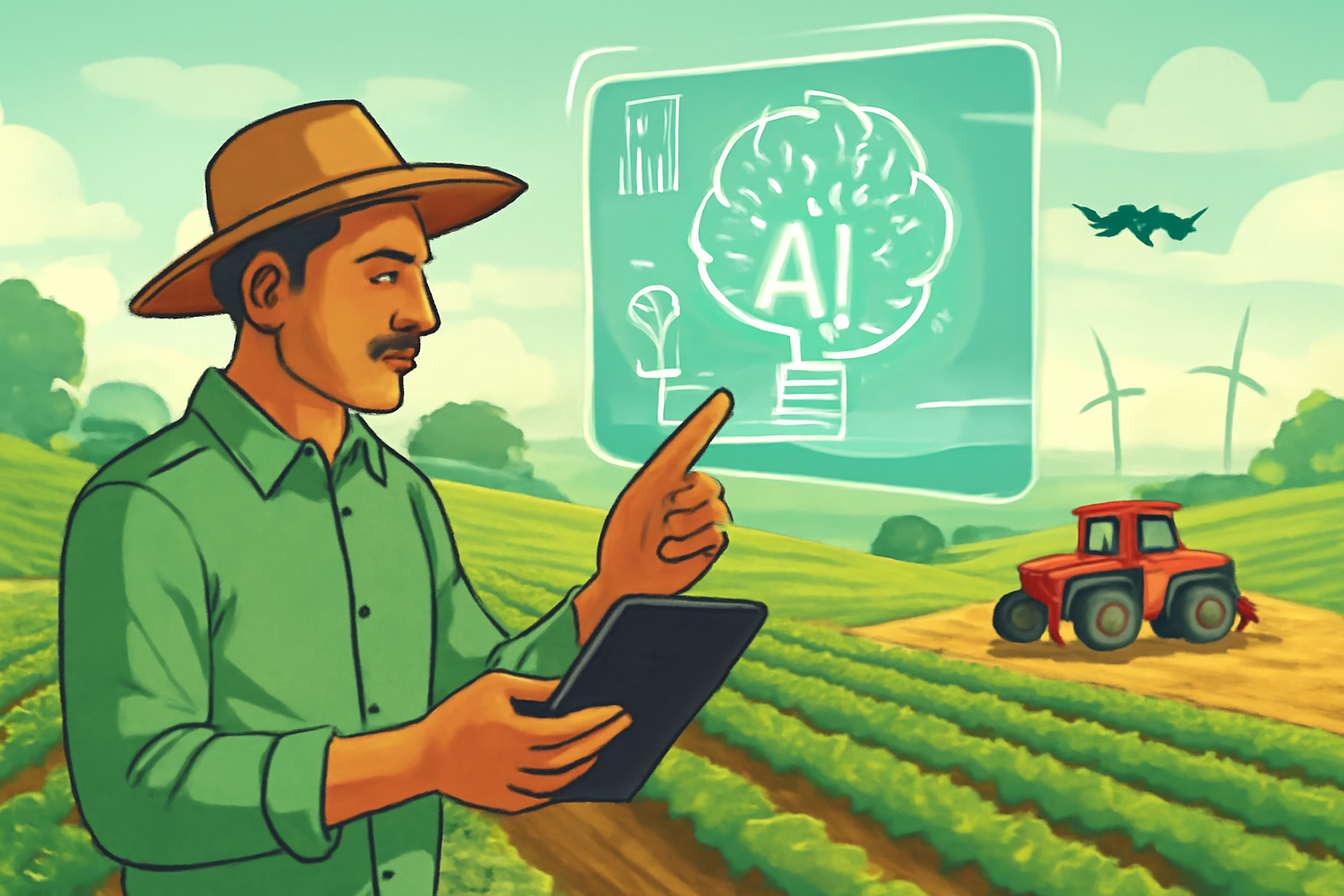Agriculture has long been the cornerstone of India’s economy, employing over half of the population. However, the sector has faced its share of challenges, including low productivity, inefficient resource use, and climate change. As we move towards a more sustainable future, Artificial Intelligence (AI) is emerging as the key to transforming farming practices.
In this article, we explore the rise of AI in agriculture and how it’s helping farmers adopt smarter farming methods to ensure sustainability, better crop yields, and reduced environmental impact.
1. Precision Farming: The Future of Agriculture
One of the most exciting advancements in AI for agriculture is precision farming. With AI-powered sensors, drones, and satellites, farmers can now monitor soil health, track weather conditions, and detect crop diseases in real-time. This wealth of data enables more accurate application of fertilizers, pesticides, and irrigation, reducing waste and boosting crop yields. Crop assessment using AI by Agribazaar is also playing a crucial role by providing farmers with timely insights into crop health and productivity. Companies are increasingly offering precision farming solutions that empower farmers to make data-driven decisions, enhancing both productivity and sustainability.
2. AI-Driven Crop Management
AI in agriculture is not just about improving crop yield; it’s also about managing crops more efficiently. AI can predict weather patterns, monitor plant growth, and suggest the best time for sowing or harvesting. This predictive ability ensures that farmers make the right decisions at the right time, leading to optimal crop performance.AI-powered platforms are helping farmers across India improve crop management and promote sustainable farming practices.
3. Sustainable Water Management with AI
Water scarcity is one of the biggest concerns for farmers, especially in a country like India, where agriculture is largely dependent on irrigation. AI is helping solve this problem by offering smart irrigation solutions. AI systems can monitor soil moisture levels and weather forecasts, ensuring that farmers use just the right amount of water for their crops. AI-driven solutions are being used to optimize water usage, promote sustainable farming practices, and minimize water wastage.
4. AI for Pest and Disease Control
Farmers have traditionally relied on chemical pesticides to protect their crops from pests and diseases. However, these chemicals often have negative environmental impacts. With AI, farmers can now detect pests and diseases early through image recognition and machine learning models. AI can analyze crop images and environmental data to identify potential threats, allowing farmers to take timely actions with fewer chemicals. AI-driven pest management solutions are enhancing crop protection and supporting sustainable agricultural practices.
5. Automated Farming Equipment: Reducing Labor Dependency
AI is also transforming the machinery used in farming. Autonomous tractors and drones equipped with AI can perform tasks like plowing, sowing, and crop monitoring without human intervention. This reduces labor dependency and allows for more efficient use of resources. AI-powered robots are increasingly used to automate tasks like planting and harvesting, making agriculture more efficient and reducing the environmental impact of manual farming practices.
6. AI-Powered Market Linkages: Connecting Farmers to Consumers
One of the significant challenges for farmers is the lack of direct access to markets. AI-powered marketplaces are bridging this gap by connecting farmers directly to buyers, ensuring that produce reaches the market efficiently. AI-powered platforms help farmers secure fair prices for their produce by analyzing demand, pricing trends, and market conditions. This leads to better deals and reduces food waste through timely sales.

7. AI for Financial Inclusion in Agriculture
Access to finance remains a major hurdle for many farmers, especially smallholders. AI is helping to democratize access to credit by assessing farm-level data to determine a farmer’s creditworthiness. AI models analyze factors such as crop performance, soil health, and market demand to offer personalized loan options. AI-driven financial solutions are helping farmers access the capital they need for equipment, agricultural inputs, and other essential resources.
8. Sustainability: AI and Environmental Conservation
AI is enabling farmers to adopt sustainable farming practices that reduce their carbon footprint. By optimizing water usage, reducing pesticide dependence, and minimizing waste, AI helps farmers contribute to environmental conservation. AI solutions offer insights on crop rotation, eco-friendly farming techniques, and organic practices, ensuring the long-term sustainability of farming. With growing environmental concerns, AI in agriculture is a step in the right direction to ensure a greener future.
9. AI in Supply Chain Optimization
AI also plays a crucial role in streamlining the agricultural supply chain. By tracking produce from farm to market, AI helps in optimizing logistics, minimizing spoilage, and reducing transportation costs. AI models predict demand patterns, ensuring that the right quantity of products is delivered at the right time, reducing food waste.AI is being used to manage agricultural supply chains more efficiently, ensuring that fresh produce reaches consumers promptly.
10. Training and Education for Farmers
AI is also revolutionizing agriculture training by offering real-time learning resources for farmers.AI-driven mobile applications are providing farmers with guidance on best farming practices, pest management, and crop care.
These applications use machine learning to provide personalized recommendations, helping farmers continuously improve their skills and stay updated on the latest advancements in sustainable farming.
Conclusion
The rise of AI in agriculture is not just about increasing productivity it’s about creating a sustainable farming future. With smarter farming practices powered by AI, farmers can reduce their environmental impact, optimize resource use, and improve their livelihoods. From AI-driven crop management to smart irrigation, the technology is providing farmers with the tools they need to thrive in a rapidly changing world.
As more agritech companies continue to innovate, the future of Indian agriculture looks brighter and more sustainable than ever before. StarAgri, a leading agritech company in India, is playing a key role in driving this transformation.



